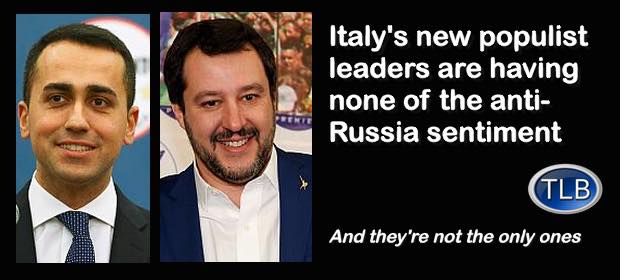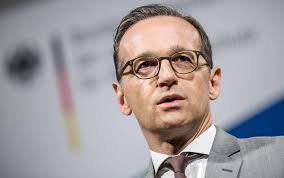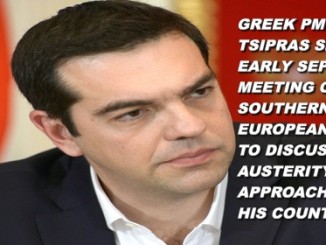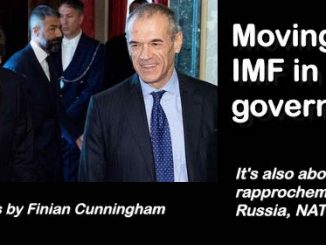
New Italian Government to Trigger Crisis in EU
ALEX GORKA
The formal consultations on forming a new coalition government in Italy kicked off on April 4. The center-right coalition led by the anti-migrant Northern League won 37% of the vote to control the most parliamentary seats while the populist 5-Star Movement won almost 33% to become the single party with the highest number of votes. Neither of them can govern alone. It does not make a great difference who President Sergio Mattarella will entrust with the task of forming a coalition government: the leader of the center-right League, Matteo Salvini, or Five Star’s Luigi De Mayo. The outcome will be the same – the EU will face a crisis over its Russia policy. By and large, the two are at one on the issue – they want the Russia sanctions lifted.

The Five Star is not simply Eurosceptic; it’s openly anti-EU. The movement has always been known as “part of a growing club of Kremlin sympathizers in the West”. It shares a pro-Moscow outlook with the League. “STOP absurd Russia sanctions” tweeted Matteo Salvini to make his position known. It coincides with the opinion of Ernesto Ferlenghi, the President of Confindustria Russia, a non-profit association, who is asking for government support of Italian businesses operating in Russia. Both agree that the sanctions hurt the Italian economy. Salvini lambasted his country’s decision to expel Russian diplomats over the so-called spy poisoning case. In March, he signed a cooperation agreement with United Russia party.
It’s almost certain that Italy, the 3rd-largest national economy in the eurozone, the 8th-largest by nominal GDP in the world, and the 12th-largest by GDP (PPP), will question the wisdom of the sanctions war. No doubt, it will be backed by a number of countries, including Greece, Austria, Cyprus, Hungary, etc. If not for pressure exercised by the EU and German leadership, the sanctions would have been eased, or even lifted, long ago, especially as Great Britain is on the way out of the bloc. The Skripal scandal can delay the discussions but not for long. It will die away. If there were solid proof to bolster the accusations against Moscow, it would have been presented to the public without procrastination to fuel anti-Russia sentiment. It has not been done. The scandal is doomed to fade away gradually.
 The expedience of the diplomat expulsions has been questioned in almost all EU member states, including Germany. Its newly appointed Foreign Minister Heiko Maas insists that Europe needs Russia as an ally to solve regional conflicts. According to him, “We are open to dialogue and are counting on building confidence again bit by bit, if Russia is ready to do so.”
The expedience of the diplomat expulsions has been questioned in almost all EU member states, including Germany. Its newly appointed Foreign Minister Heiko Maas insists that Europe needs Russia as an ally to solve regional conflicts. According to him, “We are open to dialogue and are counting on building confidence again bit by bit, if Russia is ready to do so.”
Austria and Greece have refused to join so far, but if such a big country as Italy joins them, the EU will be in a tight spot. The sanctions are to be prolonged in early fall but Rome will block their automatic extension. Italy is too big and important to be easily made kneel. This is an EU founding nation. The bloc is facing serious cracks and adding more bones of contention will put into question its very existence. Under the circumstances, gradual easing of sanctions to ultimately lift them is the best solution for the EU. That will put the US and Europe on a collision course, especially at a time the divisions over the Nord Stream-2 gas project go on deepening.
US Ambassador to the UN, Nikki Haley, has recently stated that Russia is no friend of the US. Moscow is well aware that Washington is not its friend either. It’s not about friendship but rather the need for a dialogue on equal terms to address burning issues of mutual interests.
As one can see, US hostility toward Russia does not strengthen its standing in the world. Quite the contrary, it makes the gap wider, alienating European allies. The relationship is complicated enough as it is. The pressure exercised by the US and the UK, its staunch European ally, to involve the EU in the anti-Russia campaign has provoked stiff resistance. It is strong alliances, not disagreements with close partners, that make great powers stronger.
The CAATSA law that allows punitive measures against European allies, the divisions over the Iran deal to be probably decertified by the US in May, the European resistance to the US tariff policy and a lot of other things are undermining the West’s alliance, which the US considers itself the leader of. Adding Russia to the list of European grievances hardly makes the US position in the world stronger. By ratcheting up anti-Moscow sentiment it is hurting itself, making the “America First” policy much less effective than it could be if outright hostility gave way to business-like dialogue.
Looks like those who wish Russia ill have lost an important ally. The more effort that is applied to hurting Moscow, the more damage that is done to the West’s unity.
************
Original article
ER recommends other articles by Strategic Culture Foundation




